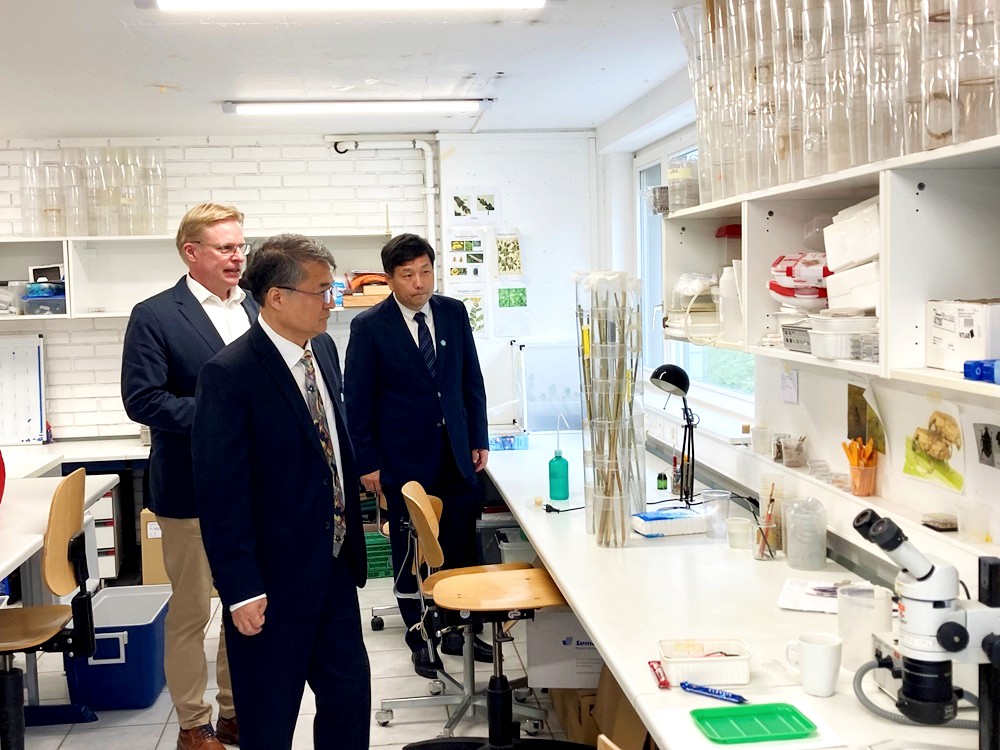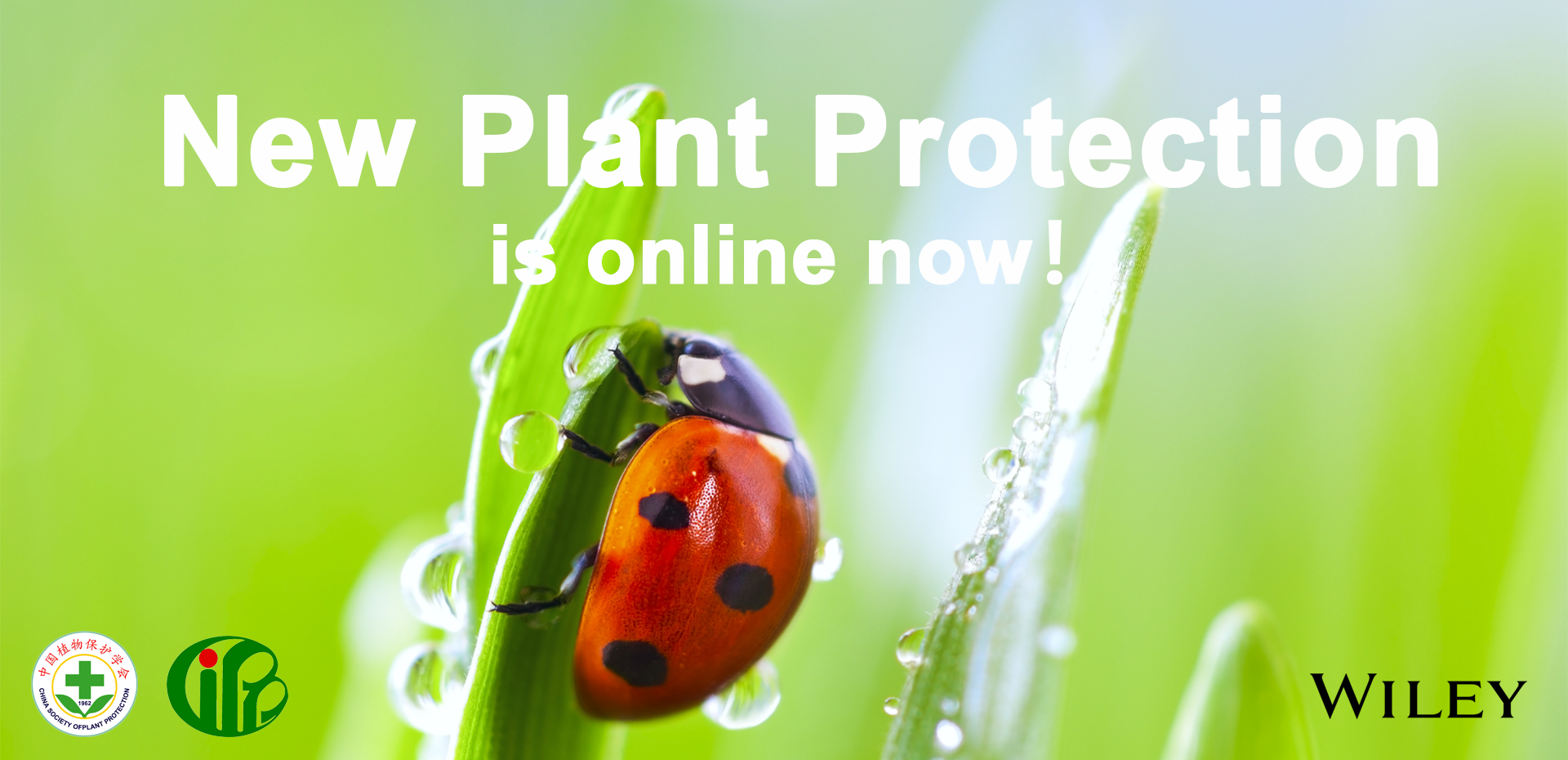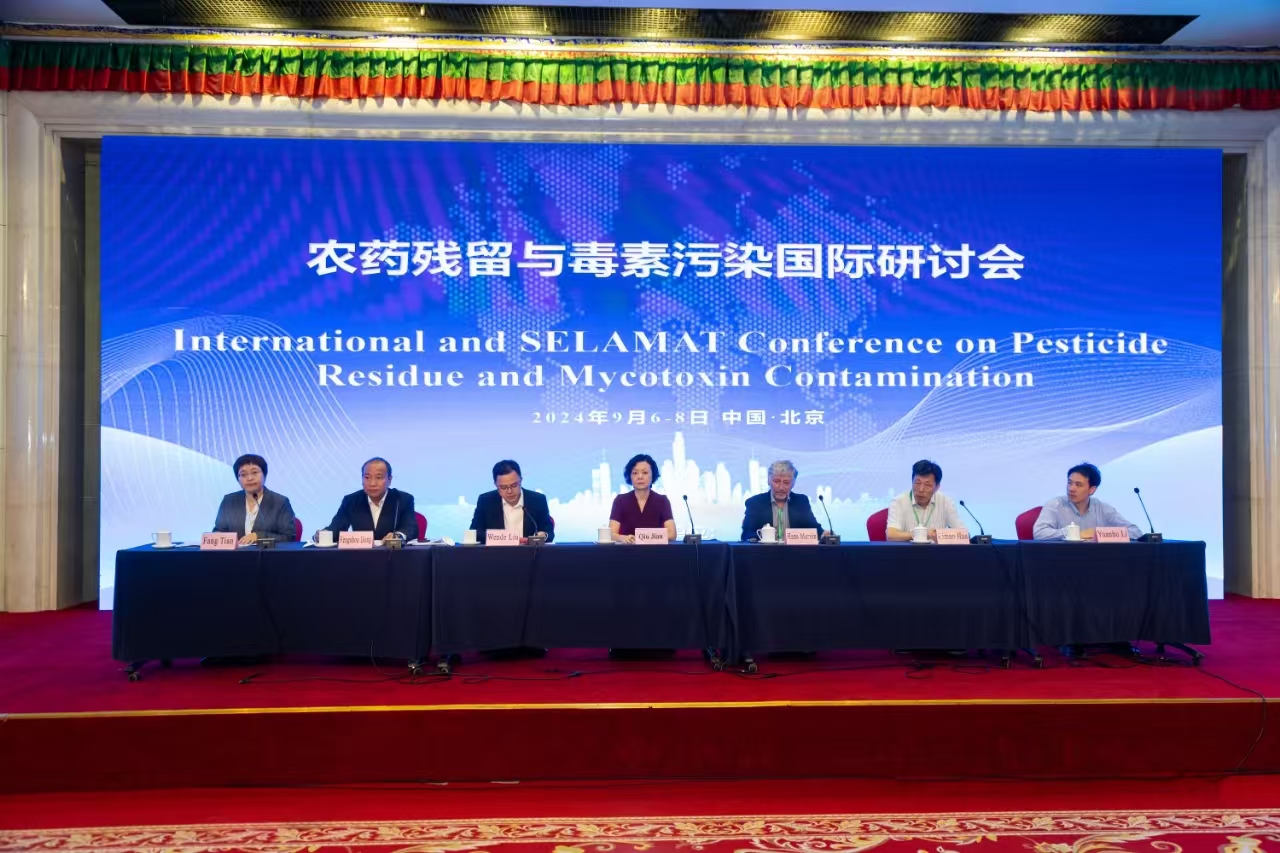Senior Chinese delegation visit to Switzerland strengthens collaboration between joint labs for crop pest research

A visit of senior managers from the Chinese Academy of Agricultural Sciences (CAAS) and Chinese Embassy in Switzerland has served to strengthen collaboration between CAAS and CABI, particularly through the joint labs for crop pest research that will help smallholder farmers increase their livelihoods and food security.
Dr Qiaoqiao Zhang, CABI’s Director of Membership, Dr Wade Jenner, Centre Director and Dr Tim Haye, Arthropod Biological Control Programme Leader welcomed this senior delegation led by Professor Wu Kongming, President of CAAS, at CABI’s Swiss Centre in Delémont and briefed them on the very latest developments at CABI and from the MARA-CABI Joint Lab for Biosafety and the affiliated MARA-CABI European Lab.
The delegation, which included Dr Lu Yanhui, Director General of the Institute of Plant Protection, CAAS, and Co-Director of the MARA-CABI Joint Lab, and Dr Jin Ke, Director General, Department of International Co-operation, CAAS and CABI Liaison Officer for China, was also updated on progress made at CABI Switzerland in general including its arthropod biological control and the PlantwisePlus programme.
Going forward after the review of the long and successful partnerships between China and CABI
Both parties reviewed the major milestones of 40 years of partnerships between China and CABI, which included China joining CABI in 1995, CABI setting up CABI Office at CAAS in 2002, and both parties setting up the MARA-CABI Joint Lab in Beijing in 2008 and the European Lab at CABI’s Swiss Centre in 2019.
After giving an overview of CABI’s latest developments and its five major goals as laid out in the Medium-Term Strategy 2023-25 (MTS), Dr Zhang thanked Member Countries like China for having helped shape this MTS and partnering with CABI in implementing the MTS.
The strategy seeks to tackle some of the biggest challenges facing humanity, including hunger, poverty, gender inequality, climate change and the loss of biodiversity.
Dr Zhang, when reviewing the history of collaboration between China and CABI, said, “The MARA-CABI Joint Lab, one of the major milestones of China-CABI partnership over the past 40 years, has already built a global network of laboratories in the field of plant protection.
“It should continue to function as an open platform for tripartite or multi-lateral collaboration among China and the Belt and Road countries to promote joint R&D, South-South cooperations, and technology transfer.”
In his remarks, Professor Wu, said, “I echo what Dr Zhang said earlier. CAAS shares similar vision and objectives with CABI in tackling national and global challenges.
“It is of vital importance that the Joint Lab and sub-centres promote technology adoption and research into use through extending the scale of the European Lab, facilitating collaboration among CABI Member Countries, integrating sub-centres into the framework of the main MARA-CABI Joint Lab, and working in partnership between China and CABI to contribute to the global combined efforts in achieving food security and to exert global influence,” he added.
Dr Jenner gave a general introduction to CABI’s work from its Swiss Centre which is a leading authority on the management of invasive weeds and arthropods using biological control agents.
New biocontrol solutions
Scientists from the Joint Lab, its affiliated European Lab and the Lab’s Chinese subcentres collaborate to provide new biocontrol solutions for invasive species such as fall armyworm (Spodoptera frugiperda ), brown marmorated stink bug (Halyomorpha halys ), yellow-spined bamboo locust (Ceracris kiangsu), and maize lethal necrosis disease.
Dr Haye spoke about current arthropod biological control research activities at the Swiss Centre as well as published research in collaboration with the MARA-CABI Joint Laboratory for Biosafety.
For example, Dr Haye joined scientists from the MARA-CABI Joint Laboratory for Biosafety and European Laboratory and those from Agriculture and Agri-Food Canada, Agroscope and CAAS on research into the invasive, red-necked longhorn beetle (Aromia bungii ) which has recently invaded Japan, Germany, and Italy.
Dr Haye also described the growing interest in pre-emptive biological control, where the process of identifying suitable biological control agents begins prior to the invasion by an exotic pest species that is very likely to arrive eventually.
PlantwisePlus programme
Dr Jenner spoke about how CABI’s flagship global PlantwisePlus programme aims to reach 75 million smallholder farmers in low and lower-middle income countries, providing them with access to the knowledge and skills they need to improve their production practices.
In 2022, 15 new plant clinics were established (bringing the total to 140 in China) and 75 new plant doctors were trained on how to help farmers diagnose and mitigate plant health problems to grow healthier and more profitable crops.
Improve the livelihoods of smallholder farmers

Dr Tim Haye with members of the senior Chinese delegation
Meanwhile, under the framework of the Joint Lab, CABI scientists from the Swiss Centre and China Centre, are working with partners, including the Institute of Plant Protection-Chinese Academy of Agricultural Sciences (IPP-CAAS), to increase the development and adoption of Integrated Pest Management (IPM) Tools.
One project, funded by the European Union, will further develop high-potential IPM tools and design cost-effective, environmentally safe IPM packages for economically important crops such as rice and maize.
CABI will also make valuable contributions to the development and efficacy of IPM tools against fall armyworm and develop a biocontrol agent for common ragweed. This includes the development of a web-based IPM tool performance demonstrator which will enable users to design and evaluate their own IPM packages.
Latest priorities and policies
Furthermore, the CAAS delegation updated CABI on the latest priorities and policies in China for sustainable agricultural development and international co-operation in agriculture. This includes future collaboration between China and CABI – particularly between its Member Countries.
Dr Jenner said, “Collaboration between the two Joint Labs is vital to help increase the capacity and uptake of training, research and delivery of sustainable and integrated pest management activities for improved livelihoods and food security.
“We look forward to building upon our relationship with colleagues in China particularly on research for improved pest preparedness, including biological control to tackle key invasive pests and diseases affecting crops of nutritional, cultural and economic importance.”
The bridging role of the Joint Lab is supported by a growing number of sub-centres. These include the European Lab, the Yunnan-CABI Sub-centre for Integrated Prevention and Control of Trans-boundary Pests, the Shandong Sub-centre for Biological Control, the Anhui Sub-centre for Agricultural Pest Control, and the Inner Mongolia-CABI Joint Laboratory as well as partner Joint-Labs, such as that of CABI and Malaysian Agricultural Research and Development Institute.
Additional information
Main image: Senior managers from the Chinese Academy of Agricultural Sciences (CAAS) with CABI colleagues at CABI’s Swiss Centre in Delémont (Credit: CABI).
Senior managers from CAAS and Chinese Embassy in Switzerland:
The full list of senior managers from CAAS and Chinese Embassy in Switzerland included Professor Wu Kongming, President of CAAS, Dr Jin Ke, Director General, Department of International Cooperation, Professor Lu Yanhui, Director General, Institute of Plant Protection of CAAS, Professor Bu Zhigao, Director General, Harbin Veterinary Research Institute, Mr Zhao Chunlei, Deputy Division Chief, General Office, Ms Bi Jieying, Director of General Office, Centre for International Agricultural Research, Mr Zhai Qijiang, First Secretary, Chinese Embassy in Switzerland, and Ms Liu Yunzhen, Attache, Chinese Embassy in Switzerland.
-
 China-Laos Training Workshop on Integrated Management of Destructive Crop Pests and Diseases Successfully held in Laos
China-Laos Training Workshop on Integrated Management of Destructive Crop Pests and Diseases Successfully held in Laos -
 New Plant Protection: New challenge and new opportunity for plant protection
New Plant Protection: New challenge and new opportunity for plant protection -
 International and SELAMAT Conference on Pesticide Residue and Mycotoxin Contamination Held in Beijing
International and SELAMAT Conference on Pesticide Residue and Mycotoxin Contamination Held in Beijing -
 CAAS President Meets Chairman of ASEAN FAW Taskforce
CAAS President Meets Chairman of ASEAN FAW Taskforce
